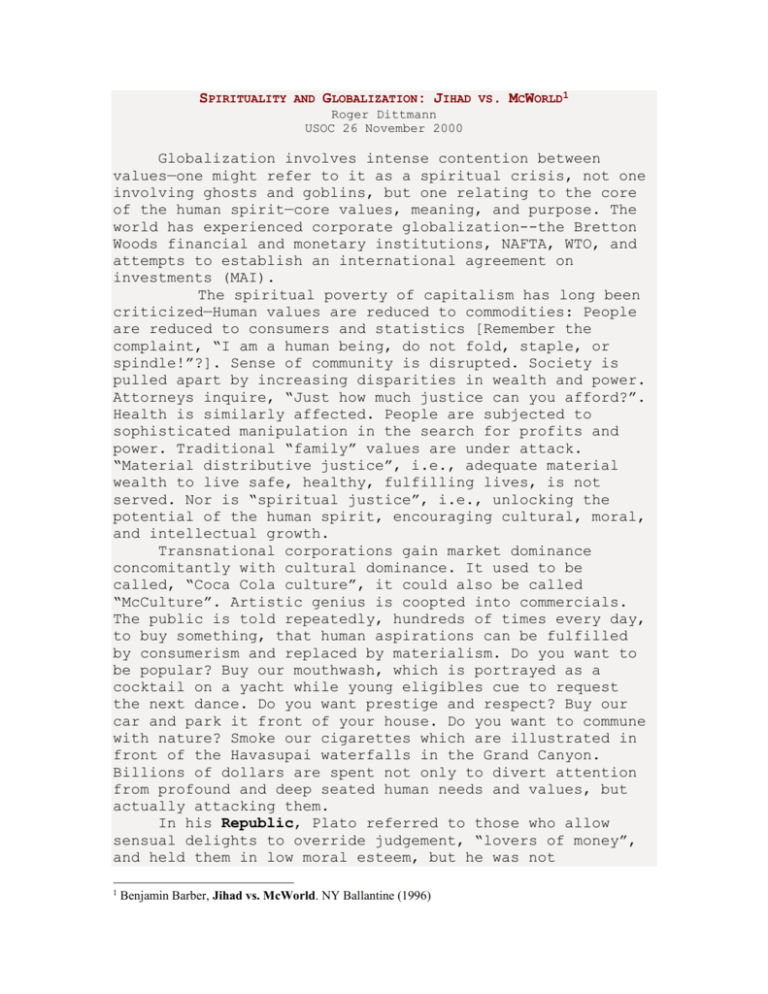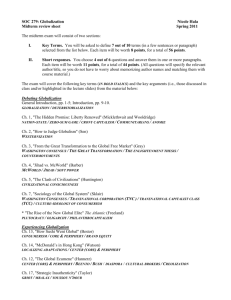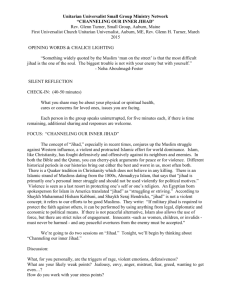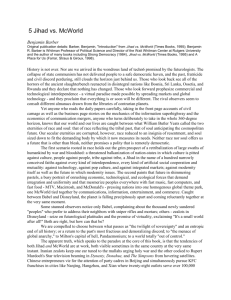Spiritualism and Globalization
advertisement

SPIRITUALITY AND GLOBALIZATION: JIHAD VS. MCWORLD1 Roger Dittmann USOC 26 November 2000 Globalization involves intense contention between values—one might refer to it as a spiritual crisis, not one involving ghosts and goblins, but one relating to the core of the human spirit—core values, meaning, and purpose. The world has experienced corporate globalization--the Bretton Woods financial and monetary institutions, NAFTA, WTO, and attempts to establish an international agreement on investments (MAI). The spiritual poverty of capitalism has long been criticized—Human values are reduced to commodities: People are reduced to consumers and statistics [Remember the complaint, “I am a human being, do not fold, staple, or spindle!”?]. Sense of community is disrupted. Society is pulled apart by increasing disparities in wealth and power. Attorneys inquire, “Just how much justice can you afford?”. Health is similarly affected. People are subjected to sophisticated manipulation in the search for profits and power. Traditional “family” values are under attack. “Material distributive justice”, i.e., adequate material wealth to live safe, healthy, fulfilling lives, is not served. Nor is “spiritual justice”, i.e., unlocking the potential of the human spirit, encouraging cultural, moral, and intellectual growth. Transnational corporations gain market dominance concomitantly with cultural dominance. It used to be called, “Coca Cola culture”, it could also be called “McCulture”. Artistic genius is coopted into commercials. The public is told repeatedly, hundreds of times every day, to buy something, that human aspirations can be fulfilled by consumerism and replaced by materialism. Do you want to be popular? Buy our mouthwash, which is portrayed as a cocktail on a yacht while young eligibles cue to request the next dance. Do you want prestige and respect? Buy our car and park it front of your house. Do you want to commune with nature? Smoke our cigarettes which are illustrated in front of the Havasupai waterfalls in the Grand Canyon. Billions of dollars are spent not only to divert attention from profound and deep seated human needs and values, but actually attacking them. In his Republic, Plato referred to those who allow sensual delights to override judgement, “lovers of money”, and held them in low moral esteem, but he was not 1 Benjamin Barber, Jihad vs. McWorld. NY Ballantine (1996) confronted by sophisticated motivational research, PR, and massive advertising in the service of consumerism. Advertising manipulates, even when consumers don’t believe it, they still buy. Capitalists don’t spend billions on advertising to support poverty stricken admen. They do it to enhance profits, and it works. If it doesn’t, they change agencies. In the financially threatened magazine, Tikkun, Michael Lerner observes that even members of affluent classes recognize the spiritual vacuity of mere acquisition of wealth. Deathbed regrets of family neglect in deference to profit and power are common. However, Lord Acton’s famous dictum has an obverse validity, “Powerless corrupts”, as does poverty. In short, maldistribution of wealth and power corrupt. As Lincoln said, “Neither slave nor master”, both corrupt. The remedy, and the path to spiritual fulfillment are democracy and economic justice. Religions generally criticize greed, but solicit money, often to cater to an edifice complex, sometimes in the midst of grinding poverty and spiritual degradation. Victims often turn to religion. Unfortunately, as Lerner laments, it often is fundamentalism [Barber’s “Jihad”] that offers a conformative palliative that does not require the effort to cope with the existential problem of meaning, purpose, fulfillment and genuine spiritual development. The contemporary spiritual quest is anchored in the injustices of capitalism now being writ globally. The Jihad has a sour grapes rejection of consumerism coupled with a rejection of McCulture, but replacing it with revanchist traditional fundamentalism rooted in faith and superstition. The path to spiritual growth and the enhancement of the human spirit lies between Jihad and McWorld. The traditional protest slogans, “People over profits”, or “People are the bottom line”, can well be extended to corporate globalization. However, UU traditional values augur for the concept of a “family of humanity”, i.e., globalization. Corporate globalization may be a blessing in disguise. The concept of a “family of humanity” requires much more than a change in attitude. It requires institutional implementation. Rather than demobilizing the WTO, and other international institutions, they could be democratized, perhaps even supranationalized. How could this be achieved? There are essentially two routes: domestic and international. Domestically, the Democratic and Republican parties stumble over each other in their obeisance to corporations and corporate globalization, although there is some internal resistance. Remember, Clinton couldn’t get fast track approval for the MAI. The Greens are building. The recent election forces the Democrats to cease taking those holding UU values for granted. They now have some place to go. The Democratic party either must coopt those holding UU values (victory!), or accede to a preferential voting system in which people can first vote their aspirations before yielding to their fears (victory!). It won’t be fast or easy, but domestic opportunities are opening. But even if corporations maintain their lock on domestic politics, there are international opportunities. Structural reform of the UN is currently unfeasible due to the requirement of unanimous concurrence among the nonelected members of the Security Council for changes to the UN Charter, unless some domestic reform, like Mike Gravel’s movement to establish a national initiative succeeds. However, functional opportunities exist. NGO’s tomorrow could establish a People’s Assembly as a pilot program in democracy. Instead of being rudely informed that a person holding contrary views to yours is your “representative” in your geographic district, essentially everyone would be allowed to have representatives that represent their views. People could be allowed multiple political identities instead of having a geographical identity imposed upon them. People could be awarded ten or so votes that they could cast on a continuing basis to organizations and representatives of their choice, bringing to fruition that hoary aspiration, “vote early and often”. They could vote their multiple interests, concerns, and identities, as environmentalists, feminists, trade unionists, family values, etc., whatever they choose. As long as representatives maintained a minimum number of adherents, they would retain their seat. Once established as a shadow UN government, passing non-binding resolutions, like the General Assembly does, it would establish a history that, I expect, would make some people less fearful of democracy.






